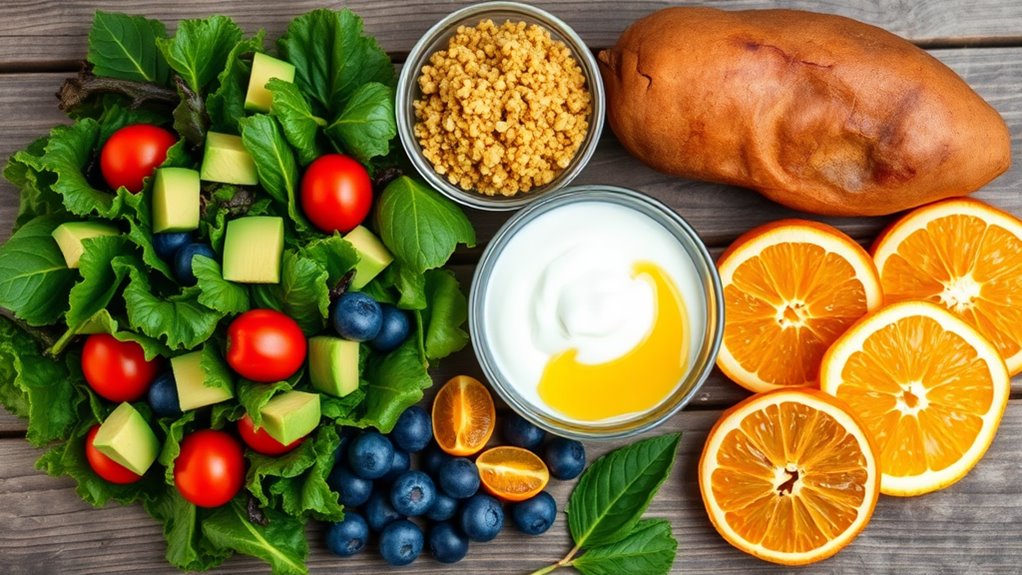6 Anti-Inflammatory Foods You Should Be Eating Weekly
Key Takeaways
- Incorporate berries like blueberries and strawberries into your diet for their antioxidants that fight inflammation.
- Consume fatty fish such as salmon and mackerel at least twice a week for their omega-3 fatty acids.
- Add leafy greens like spinach and kale for their powerful vitamins and minerals that support immune health.
- Include turmeric in your meals to leverage its curcumin content, which helps reduce inflammation levels.
- Use extra virgin olive oil for its healthy fats and anti-inflammatory effects, enhancing overall well-being.
Berries
Berries are small powerhouses of nutrition, packed with antioxidants that combat inflammation.
Including blueberries, strawberries, and blackberries in your diet can markedly boost your health. They’re rich in vitamins C and K, which contribute to immune function and reduce chronic inflammation.
Fatty Fish
Fatty fish, like salmon, mackerel, and sardines, are rich in omega-3 fatty acids, which have strong anti-inflammatory properties. Including these types of fish in your diet can help reduce inflammation and improve overall health. Additionally, incorporating herbal teas into your routine can further enhance your wellness by providing improved digestion and relaxation. Make sure to enjoy them regularly to reap these benefits.
Omega-3 Fatty Acids
When it comes to combating inflammation, omega-3 fatty acids, primarily found in fatty fish, play an essential role in promoting overall health.
These powerful nutrients help reduce inflammatory markers in the body, which can alleviate chronic conditions such as arthritis and heart disease.
Recommended Types of Fish
Including omega-3-rich fish in your diet is one of the best ways to harness the power of these beneficial fatty acids.
Fatty fish like salmon, mackerel, sardines, and trout are excellent choices. They’re not only packed with omega-3s but also provide high-quality protein and essential nutrients.
Aim to include these fish in your meals at least twice a week for ideal anti-inflammatory benefits.
Leafy Greens
Leafy greens are among the most powerful anti-inflammatory foods you can add to your diet. Packed with vitamins, minerals, and antioxidants, options like spinach, kale, and Swiss chard can help reduce inflammation and promote overall health.
Incorporating these greens into your meals not only supports your immune system but also enhances your well-being, making them essential for a balanced diet.
Turmeric
Turmeric stands out as a remarkable anti-inflammatory spice that can complement the benefits of leafy greens in your diet.
Its active compound, curcumin, has been shown to reduce inflammation markers in the body. Additionally, turmeric is recognized for its potential to enhance healing properties through its antioxidant effects.
You can easily incorporate turmeric into your meals by adding it to soups, smoothies, or stir-fries, enhancing not only flavor but also your overall health and well-being.
Olives and Olive Oil
Olives and olive oil are powerhouse ingredients known for their anti-inflammatory properties. Rich in monounsaturated fats and antioxidants, they’re linked to reduced inflammation and improved heart health. Extra virgin olive oil, in particular, contains oleocanthal, which mimics ibuprofen’s effects. Additionally, incorporating simple tea recipes into your diet can further enhance your immunity and overall well-being.
Nuts
Nuts are another powerful addition to an anti-inflammatory diet, offering a rich source of healthy fats, protein, and essential nutrients.
Almonds, walnuts, and hazelnuts, for example, contain omega-3 fatty acids and antioxidants that help lower inflammation.
Regularly incorporating a handful of nuts into your meals can enhance heart health, support weight management, and provide your body with essential vitamins and minerals. Furthermore, including nuts in your diet can also supply your body with essential vitamins for women that are crucial for overall health.

